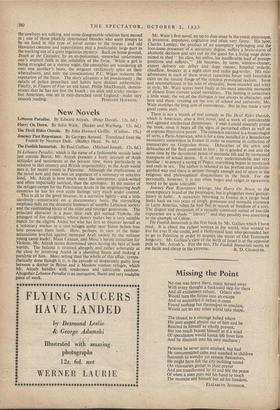New Novels
The Foolish Immortals. By Paul Gallico. (Michael Joseph. 12s. 6d.)
IN Lebanon Paradiie, which is the name of a fashionable seaside hotel just outside Beirut, Mr. Atiyah presents a lively account of Arab attitudes and sentiments at the present time, more particularly in relation to this country and British responsibility, as the Arab world sees it, for recent events in Palestine. Although the implications of the novel now and then rest on argument of a summary or selective kind, Mr. Atiyah is here much more the interpreter, quick-witted and often impartially satirical, than the apologist. In the matter of the refugee camps for the Palestinian Arabs in the neighbouring Arab countries he has his own acute feelings very much under control.
This is all to the good because, in a narrative lightly—and a little carelessly—constructed on a documentary basis, the storytelling emphasis falls on the domestic humours of wealthy Lebanese society and the contrasting ideals of the older and younger generation. The principal character is a poor little rich girl named Violette, the youngest of five daughters, whose dowry makes her a very suitable match for the eligible Andre but who has first to discover herself as a voluntary worker in a vast refugee camp near Sidon before true love possesses them both. Here, perhaps, in view of the bitter accusations levelled against moneyed Arab society by the militant young camp leader, Musa Canaan, and Musa's heroic attraction for Violette, Mr. Atiyah seems determined upon having the best of both worlds. The balance is restored abruptly and rather arbitrarily at the close by involving Andre in a shooting fiasco and making a paralytic of him. More telling than the whole of this affair, sympa- thetically done though it is, is the episode of desperately guilty love between a doctor in Beirut and a Moslem woman refugee, which Mr. Atiyah handles with tenderness and admirable candour. Altogether Lebanon Paradise is an instructive, fluent and very readable piece of work.
Mr. Wain's first novel, an up-to-date essay in the comic picaresque, is inventive, impulsive, cogitative and often very funny. His hero, Charles Lumley, the product of an' exemplary upbringing and the foot-loose possessor of a university degree, suffers a brain-storm of alcoholic decision and sets out on the quest for a living wage deter- mined to shed " his class, his milieu, his insufferable load of presup- positions and reflexes." He becomes, by turns, window-cleaner, export delivery car driver and dope runner, hospital orderly, chauffeur, bouncer at a night club and radio gag-writer. His mis- adventures in each of these several capacities hover with breathless calm on the lunatic fringe of the strictest provincial realisin. Terse and uncomplicated in his vein of absurdity, loose-muscled and witty in style, Mr. Wain scores most freely at his most anarchic moments of dissent from current social moralities. The fooling is sometimes a little weak, the wit of the dialogue is not always in character, and here and there, rotating on the axis of school and university, Mr. Wain stretches the long arm of coincidence. But he has made a very good comic start.
There is not a breath of real comedy in The Devil Rides Outside, which is American, also a first novel, and a work of considerable and agitated intellectual dimensions. I wish I could sincerely praise the book, since it bears all the signs of perturbed effort as well as of copious illustrative power. The nameless narrator is a musicologist of sorts, a Paris-American, who is for a time installed in a Benedictine monastery somewhere in France in order to examine its collection of manuscripts on Gregorian music. Debauches of the spirit and debauches of the flesh contend in him ; he is goaded at one and the same time by the devotional peace of monastic life and by tormented transports of sexual desire. It is all very understandable and very familiar to amend a saying of Peguy, everything begins in mysticism and ends in sex. The author is talented in his profuse and undistin- guished way and there is serious thought enough and to spare in the religious and philosophical disquisitions in the book. For me personally, however, it is too often bogus and vulgar in egocentric mood to be quite tolerable. Journey Past Repentance belongs, like Hurry On Down, to the contemporary brand of the picaresque, but is altogether more'gesticu- latory in habit. A stowaway returning to France in a .cargo boat looks back on two years of tough, grotesque and nomadic existence in Latin America, when he had fled in search of freedom of a sort. The disgust and pessimism of a casually contrived recital of low-life experience are a shade " literary" and nlay possibly owe something to the example of Celine. The Foolish Immortals is the first book by Mr. Gallico which I have read. It is about the richest woman in the world, who wanted to live for ever If she could, and a Hollywood tout who persuaded her to go to Palestine in order to acquire the secret of Old Testament longevity. Mr. Gallico's view of the birth of Israel is at the opposite pole to Mr. Atiyah's. For the rest, The Foolish Immortals seems to
me facile and cheap in the extreme. R. D. CHARQUES.


















































 Previous page
Previous page